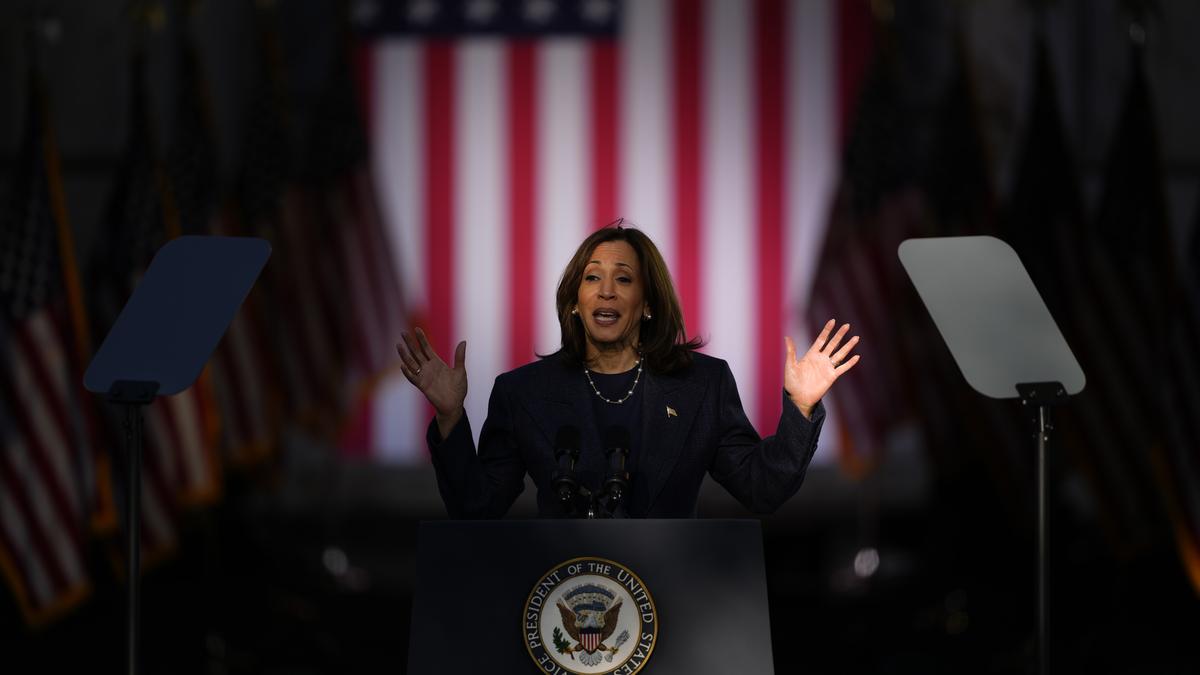Democratic presidential nominee, U.S. Vice-President Kamala Harris speaks during a campaign event at Washington Crossing Historic Park in Washington Crossing, Pennsylvania on October 16, 2024.
| Photo Credit: AP
Last month, the editorial board of The New York Times endorsed Democratic presidential nominee, Kamala Harris, keeping with the tradition of media endorsements of political candidates that began, for that newspaper, in 1896. The endorsement was unequivocal, reflecting the view of The Times that there was absolute clarity about “the only patriotic choice for president.”
On the one hand, it is hard to disagree with the assessment of the newspaper of record that Ms. Harris’s Republican rival, Donald Trump, has degraded the quality of American democracy by challenging the 2020 election result and playing a role in the 2021 insurrection against the Capitol in Washington, D.C.; undermined federal institutions by attempting to subvert them; damaged the U.S.’s standing on the global stage through his reckless approach to foreign policy; and represents a flawed leader who has racked up not just two Congressional impeachments but faces numerous civil and criminal charges linked to actions during his time in the White House. The newspaper, which has not endorsed a Republican presidential candidate since 1956, also levelled fair criticism at Ms. Harris for not sharing more details about her policy plans and proposed agenda for the U.S., as well as engaging in more unscripted encounters in which she might have explained her vision with more clarity.
Yet, in the context of the tectonic changes that have swept across the media space and the ever-broader spectrum of communication options for political messaging, it is pertinent to ask whether newspaper endorsements such as these make any difference on the ground. Even if they do matter to some cohort of voters, should media houses be engaging in what is essentially a form of political activism in the current climate of bitter polarisation in U.S. society, where many voters distrust media opinions, or have already made up their minds on political issues, candidates, and parties?
These questions are gaining greater salience with each election cycle. While it will continue to endorse presidential candidates, The Times had earlier announced that it will no longer endorse candidates in Senate, congressional, and state legislative contests. In doing so, the newspaper joins peers such as the Miami Herald, the Chicago Tribune, the New York Daily News, and The Denver Post, which are moving away from the tradition of endorsement, seen in some quarters as archaic.
The media endorsement that stood out most during my tenure as U.S. correspondent of this newspaper was of Democratic nominee Hillary Clinton by more than 50 publications in the run-up to the 2016 elections. While five media houses backed the “none of the above” option, only two endorsed Mr. Trump, who eventually went on to win the election.
Yet, the remarkable transformation of the media landscape for election campaigns had begun much earlier, with the 2008 presidential run of Barack Obama, then a young Senator from Illinois, which demonstrated the sheer power of fundraising through social media platforms. His unprecedented social media strategy for electioneering by effectively bypassing the mainstream media, rendering it toothless in candidates’ race for political credentials, permanently altered the play book for both Democrats and Republicans in the succeeding decades.
Although the perceived value of social media platforms as election campaign tools was partially dented by the Cambridge Analytica crisis of Facebook and the disconcerting user privacy questions that it raised, and the impact of AI-related challenges including the rise of Deepfakes, it offers other avenues for popular outreach, including through celebrities. Little wonder then that the Harris campaign appeared to celebrate its endorsement by singer Taylor Swift far more than it did any newspaper endorsement.
narayan@thehindu.co.in
Published – October 18, 2024 12:02 am IST

